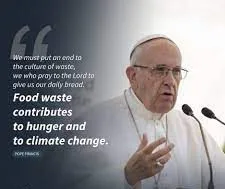Article shared by Faith Muthoni for MK-Africa.
One-third of all food produced worldwide is lost or wasted annually. The Food Waste Index Report 2021 by UNEP indicates that food loss and wastage account for Ksh 72 billion annually in Kenya. This waste food went into the waste bins of households, retailers, restaurants and other food services, with households being the major contributors to food waste.
The impact of food wastage goes beyond just hunger; it also has severe environmental, economic, and social consequences. From the greenhouse gases released by rotting food to the resources wasted in its production and transportation, the cost of food wastage is staggering.

“Throwing away food is like stealing from the table of those who are poor and hungry.” Pope Francis
Discussing food wastage without addressing how agricultural practices contribute to this issue is impossible. Factors such as overproduction, inadequate storage facilities, poor handling and transportation, market demands, short shelf life, adverse weather conditions, lack of infrastructure, and mismanagement can lead to food wastage. Better planning and management practices, proper storage facilities, effective supply chain management, and efficient distribution systems are needed. Developing adequate infrastructure and facilitating better market access for smallholder farmers can also help reduce food losses.
The problem begins in our homes. Leftovers on our plates after every meal may seem harmless, but they can accumulate up to 99 kilograms of wasted food annually by every Kenyan. By planning meals and shopping more efficiently, using leftovers creatively, and educating our families, we can reduce food wastage domestically. April 26th is ‘Stop Food Waste Day.’ You can reduce food waste by serving what you can finish on your plate. This small action can help reduce food waste in landfills, protect our environment, and pave the way for a better future.


